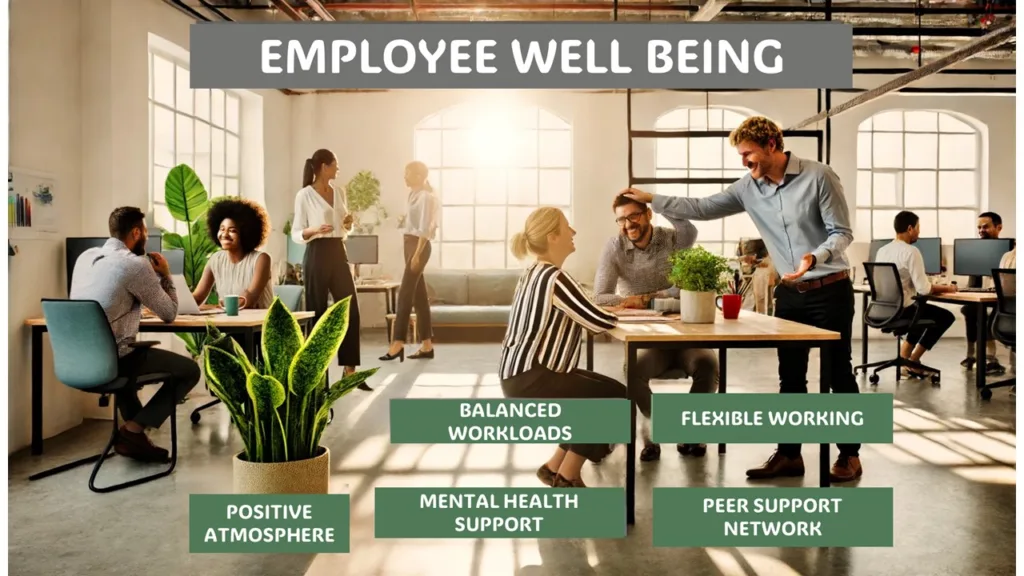Employee wellbeing goes beyond mere programs. It involves prioritizing health and balance in the workplace. By fostering a supportive environment with balanced workloads, flexible arrangements, and mental health support, companies can enhance productivity and job satisfaction. Prioritizing holistic well-being leads to engaged and effective employees.
Table of Contents
Ignoring the signs:
Employee Wellbeing is a Buzzword Today but… It’s Not Okay to Get Sick
I’d been feeling not okay for a few weeks. Nothing specific, just generally sleepy, tired, not able to focus completely. There was no fever, no pain, no “symptoms”. So, you put it down to stress and power through. If you rest, you feel guilty, lazy, unproductive. So, you push yourself more. And then you get sick/ ill.
The Unspoken Expectation
It’s not okay to get sick. Companies, clients even your family don’t like it. And it’s not primarily because they are not concerned for your health. It’s because of the inconvenience it causes everyone around you. That’s the problem. Yet, the very support system that doesn’t want you to get ill, doesn’t really do much to ensure that you stay healthy. And by that I don’t mean eat well, or give up smoking or drink less… these are boiler plate prescriptions that masquerade as concern.
Real Health Support
I’m talking about the things that really ensure you are healthy.
- A balanced workload.
- A peaceful, non-stressful, non-judgemental home environment.
- A great work atmosphere with just the right levels of motivation and productivity.
- Guilt-free time off, me time.
- Fun!
Listening to Your Body
A physical illness is your body’s way of letting you know that it got too much. It was time for a break, for some down time. But when that happens, it comes with pain, discomfort and sometimes life-threatening consequences.
Wouldn’t it be better if we scheduled all of this for ourselves while you can actually enjoy your down time.
The Workplace Reaction
What happens when an employee gets sick. When you find out someone in your team is pregnant. What is your first reaction?
Is it – Oh, I hope they’re okay or is it.. oh C**p, who’s going to take care of their work?
Personal Experience
I’ve been guilty of that myself. One of my trainers was recently unwell, hospitalized even and because I had a deadline and she was handling an important aspect of the project, I needed her to at the very least send me what she was working on. She sent me the file, I worked on it and sent it to the client and we waited for 2 weeks for their feedback/ approval on it.
Questioning Priorities
What’s wrong with this picture. Why do we hold largely man-made and fairly independent deadlines so sacrosanct. More important than our health even our sanity.
When we are unwell, even just on our period, don’t we have the right, as humans to just rest, mentally and physically. Just rest. Don’t worry about work, don’t stress about deliverables, don’t even read your emails. Just rest.
Cultural Shift
But that has to go all the way up the chain. Your team must understand, your clients must understand and everyone both “upstream” and “downstream” must understand. For that to happen though, you need to be dispensable and no one who’s doing anything worthwhile is dispensable (at least in the short term).
Managing Around Illness
But it is possible to work around, to keep the person who is unwell sheltered, protected and supported, just for a little while, till they recover. After all postponing a training program or a project launch will not, or should not derail the entire company, or kill anyone, and everything else can be MANAGED.
Elements of True Wellbeing

True employee wellbeing goes beyond the usual recommendations of eating well or reducing vices like smoking and drinking. It’s about creating an environment that genuinely nurtures and supports employees on a holistic level. Here are some essential elements:
- Balanced Workload: Employees should have a manageable workload that allows them to perform well without excessive stress. Overloading employees leads to burnout and decreased productivity.
- Positive Work Atmosphere: A positive work environment is essential. It should motivate employees while maintaining a low-stress, non-judgmental atmosphere that encourages creativity and collaboration.
- Flexible Work Arrangements: Providing flexible work arrangements, including remote options, can significantly contribute to better work-life balance.
- Mental Health Support: Employers should offer comprehensive mental health resources and support, ensuring that employees feel comfortable seeking help without fear of stigma.
- Transparent Communication: Openly communicate the importance of self-care and the company’s commitment to employee wellbeing. Transparency builds trust and encourages employees to prioritize their health.
- Peer Support Networks: Encouraging peer support networks allows employees to provide emotional assistance to each other during challenging times.
How Breakfree is helping Clients:
At Breakfree Consulting, we specialize in helping companies implement these essential elements of true employee wellbeing. Our comprehensive programs are designed to create supportive, nurturing environments that promote both physical and mental health. Contact us today to learn how we can help your organization thrive by prioritizing the health and wellbeing of your employees.
Conclusion
Employee wellbeing is crucial for a healthy, productive work environment. Prioritizing health over hustle fosters a culture that values holistic wellbeing, requiring balanced workloads, positive atmospheres, flexible arrangements, mental health support, transparent communication, and peer support networks. Adopting these practices improves employee quality of life, productivity, and job satisfaction. It’s time to embrace a compassionate approach to workplace wellness, recognizing that a healthy employee is an engaged and effective employee.
References
- For more insights on maintaining the P/PC Balance, read about Steven Covey’s concept of not killing the goose that lays the golden egg here and here.
FAQs
Q1: What is employee wellbeing and why is it important? Employee wellbeing refers to the overall physical, mental, and emotional health of employees. It is important because a healthy workforce is more productive, engaged, and satisfied with their jobs. Prioritizing employee wellbeing can reduce absenteeism, lower healthcare costs, and improve company morale.
Q2: How can companies create a balanced workload for employees? Companies can create a balanced workload by setting realistic goals, avoiding overloading employees with excessive tasks, providing adequate resources, and ensuring fair distribution of work. Regularly reviewing and adjusting workloads can help maintain balance.
Q3: What constitutes a positive work atmosphere? A positive work atmosphere is one where employees feel motivated, supported, and free from excessive stress. It includes open communication, mutual respect, recognition of achievements, and opportunities for professional growth. A non-judgmental environment that encourages collaboration and creativity is key.
Q4: Why are flexible work arrangements important for employee wellbeing? Flexible work arrangements, such as remote work options or flexible hours, allow employees to better manage their work-life balance. This flexibility can reduce stress, increase job satisfaction, and improve overall productivity by accommodating personal needs and preferences.
Q5: How can companies support employee mental health? Companies can support employee mental health by offering comprehensive mental health resources, such as counseling services, mental health days, and stress management programs. Creating a culture where seeking help is encouraged and free from stigma is also crucial.
